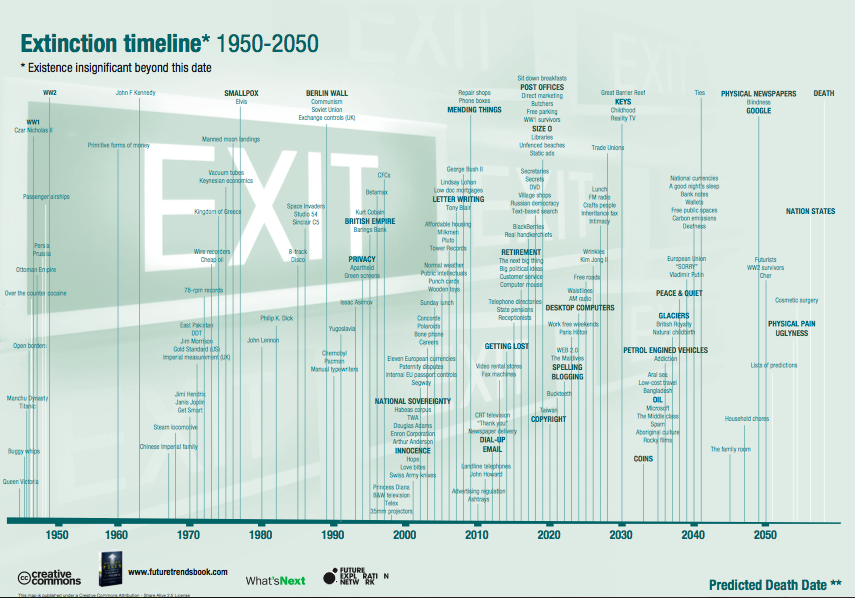I wrote this a while ago for Fast Company magazine, but it occurs on me that a few readers might not has seen it…
Given that the average lifespan of a top 500 company in the U.S. is 40 years (12.5 years in Europe) there appears to be a serious problem with corporate longevity. But why?
One reason could be that nothing recedes quite like success – or, as Bill Gates once said, “success is a lousy teacher, it seduces smart people into thinking they can’t lose.” All companies start off as an idea. Start-ups are usually small and poor, which tends to create focus and urgency. If they develop a great product or service with an easily communicable point of difference, they usually grow. And therein lies a problem.
One of the first issues to arise in a growing company is that management gets separated from innovation. Peter Drucker made this point many years ago, although he used the term entrepreneurship. Although managing and innovating are different dimensions of the same thing, most companies regard them as separate. Moreover, as the urgency to stay alive evaporates, the focus shifts to internal management issues. But without continuing to innovate, companies die.
There are other challenges too. As companies grow, senior managers become physically separated from their customers. The entire board of one of the major banks in Australia takes calls from customers every week, but this is a rare exception. A recent survey by Bain & Company found that 80% of companies believed that their firm delivered superior service. Only 8% of their customers agreed. Perhaps senior managers are confusing profitable customers with happy ones. Departments like sales and customer service are usually close to the needs of customers. Hence they are close to one of the primary sources of innovation. Managers generally aren’t — they are close to the needs of management.
The culture of an organization can also contribute to failure. The dominant culture of most successful companies is conservative — to avoid risk and to proceed in an orderly fashion. This is fine in the short term, but longer-term, what made your company successful in the past may not do so in the future. Eventually a kind of corporate immune system develops that resists innovation and tries to free itself from any form of obligation to adapt, even when change is clearly on the horizon. IBM failing to see the rise of desktop computing is a good example of such Group Think. One suspects that Sony’s loss of the portable music and entertainment market or the failure of Kodak to adapt might be others. I’d say that most banks are similarly in denial.
You can spot such organizations a mile off because they tend to distrust people from the outside (including their own customers). They also think that they have absolutely nothing to learn from anyone or anywhere else. A classic mistake is only recruiting from the inside. I once worked with a retailer that strongly favoured home-grown talent over external hires. Nothing wrong with that, except in this case it reinforced the arrogant and complacent attitude that there was anything to learn from the outside.
There is also the issue of creating the reality you want, rather than seeing what is really happening. It is not uncommon for senior managers to “edit” news before it reaches the board level — so things appear much better than they really are. There’s even a story about a supermarket chain in the U.S. that repainted its stores, and hired extra staff, just before the CEO was due to make a visit. I don’t think the company ever went as far as hiring customers for the day, but once you start editing reality where do you stop? In addition to corporate culture, corporate structure often gives rise to another problem. As Clayton Christensen points out, large organizations are generally structured on departmental levels. As a result most innovation is incremental. For example, most innovation inside fast-moving consumer goods companies takes the form of endless line extensions to existing products. Unfortunately, young start-ups have no respect for these boundaries, so it is generally they who invent new categories and business models in response to changing conditions or new customer attitudes and behavior. In other words, unless you can look at innovation from a whole business perspective and make innovation truly cross-functional (twinning designers with R&D staff as Procter & Gamble now does, for instance) innovation will never get beyond the component or existing category/product level.
But perhaps none of this is a bad thing. After all, survival is not compulsory. Perhaps everything (individuals, organizations, markets, countries) need to die – or at least be threatened with extinction – so that the cycle of innovation can begin again.
Here are a few quick tips to prevent your organization from doing dumb stuff and dying too young.
•Water your roots. Re-discover the entrepreneurial zeal and focus that founded your company in the first place.
• Think about how a start-up would operate in your market. How could you apply this thinking to make your own organization more resilient?
• Don’t just look at what the big guys are doing. Study what the start-ups are doing, especially those on the fringes of your market.
• History repeats itself. Companies and markets tend to operate in cycles, so know where you are and act accordingly.





